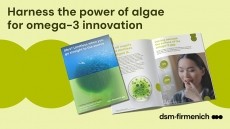Intake of plant compounds linked to lower COVID-19 risk

The study examined the relationship between phytochemical consumption, gut microbiota, and the risk of COVID-19 disease among non-obese 25-45-year-old subjects without comorbidities.
Results suggested that higher intake of total polyphenols, specific lignans such as secoisolariciresinol and matairesinol, as well as total phytosterols and subclasses stigmasterols and β-sitosterols, was associated with a lower risk of COVID-19.
Significance
The authors of the new study note that the pandemic highlighted the need to reduce susceptibility to infections, even among younger and healthier individuals.
Previous research has found that good nutritional status might be treated as a measure of resilience toward pathogens such as SARS-CoV-2.
Diet components, particularly antioxidants and anti-inflammatory agents like polyphenols and phytosterols, have been shown to have immune-boosting and antiviral properties.
Previous research has demonstrated that dietary polyphenols can affect dendritic cells, increase the proliferation of B cells and T cells, and might alter the phenotype of macrophages thus having an immunomodulatory effect.
Phytosterols notably have therapeutic potential against oxidative stress, gut dysbiosis, and inflammation.
Plant-based diets rich in phytochemicals have also been found to help in lipid metabolism regulation counteracting virus entry into the cell and virus propagation.
Despite prior investigations into how nutrition affects COVID-19, the authors of the study note that there's a lack of research exploring the potential of specific compounds like lignans and phytosterols in interacting with the immune system and viral infections.
They state: “Although previous research explored how certain nutritional factors may affect COVID-19 infection via modulation of the immune system, to the best of our knowledge there is no study that investigated the potential of individual lignans and phytosterols in interacting with the immune system from the gastrointestinal tract, and in affecting viral infections, including SARS-CoV-2.
“We aimed to perform the study examining the association of dietary intake of polyphenols and plant sterols with the abundance of immunomodulatory gut microbiota such as Enterococcus spp. and Escherichia coli and with the risk of contraction of the disease among physically active, non-obese early adults and early middle-aged subjects without comorbidities.”
The study
The study was conducted between July and November 2020 on 95 participants, 73 men (76.8%) and 22 women (23.2%), aged 25–45 years (mean = 34.66, SD = 5.76), every fourth of whom (n = 24) have contracted COVID-19.
Respondents were instructed not to change their daily routine, including eating habits and physical exercise patterns
During a 1-week follow-up, participants tracked their physical activity, total energy expenditure (TEE), and sleep duration using a Polar M430 watch, as well as keeping dietary records.
Stool samples were collected for gut microbiome testing, core elements of anthropometry and body composition were recorded as well as participants were asked to complete a socio-demographic questionnaire.
Dietary polyphenol, lignan, and plant sterol intakes were retrieved based on the amount of food consumed by the participants, and the phytochemical content assessed in laboratory analysis and using available databases.
The authors concluded: “For all investigated polyphenols and phytosterols, except campesterol, every unit increase in the tertile of intake category was associated with a decrease in the odds of contracting COVID-19.
“The risk reduction ranged from several dozen percent to 70 %, depending on the individual plant-based chemical, and after controlling for basic covariates it was statistically significant for secoisolariciresinol (OR = 0.28, 95% CI: 0.11–0.61), total phytosterols (OR = 0.47, 95% CI: 0.22–0.95) and for stigmasterols (OR = 0.34, 95% CI: 0.14–0.72).
“We found an inverse association between increased β-sitosterol intake and phytosterols in total and the occurrence of Escherichia coli in stool samples outside reference values, with 72% (OR = 0.28, 95% CI: 0.08–0.86) and 66% (OR = 0.34, 95% CI: 0.10–1.08) reduced odds of abnormal level of bacteria for the highest compared with the lowest tertile of phytochemical consumption.”
The authors concluded: “The results of the current study support the hypothesis that a diet rich in phytosterols and polyphenols, including lignans, can help to reduce the risk of COVID-19 contraction.”
They hypothesise that findings suggest that high consumption of their several representatives, namely β-sitosterol and lariciresinol, may be positively associated with the presence at a relevant level of some strains of commensal bacteria species such as Escherichia coli and Enterococcus spp. which support the immune system.
They note that various phytochemicals can have a differential effect on gut microbiome and influenza-like diseases, and therefore, further research is needed to explore these outcomes in relation to the bioavailability of specific phytosterols and lignans.
Journal: Frontiers in Nutrition
https://www.frontiersin.org/articles/10.3389/fnut.2023.1241016/full
“Association of dietary intake of polyphenols, lignans, and phytosterols with immune-stimulating microbiota and COVID-19 risk in a group of Polish men and women”
Authors: Agnieszka Micek, Izabela Bolesławska, Paweł Jagielski, Kamil Konopka, Anna Waśkiewicz, Anna Maria Witkowska, Juliusz Przysławski and Justyna Godos.











